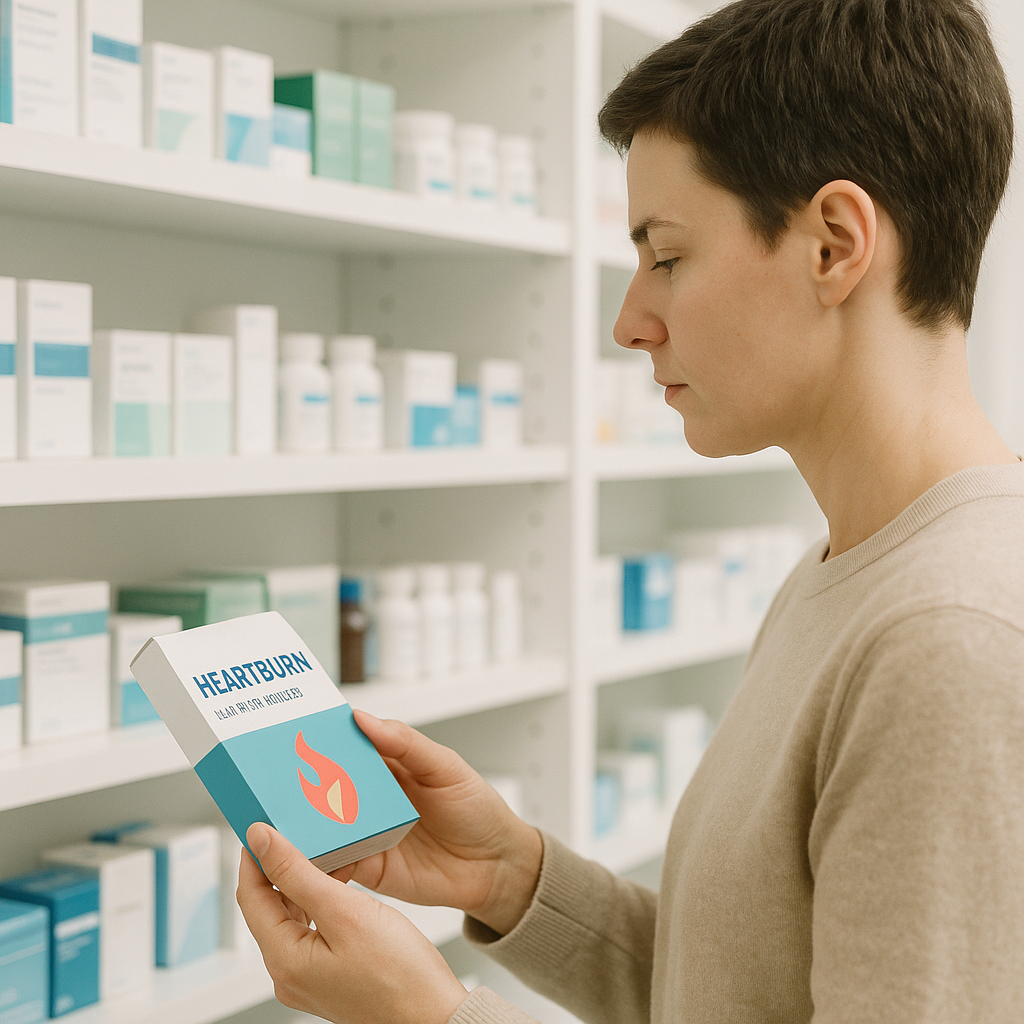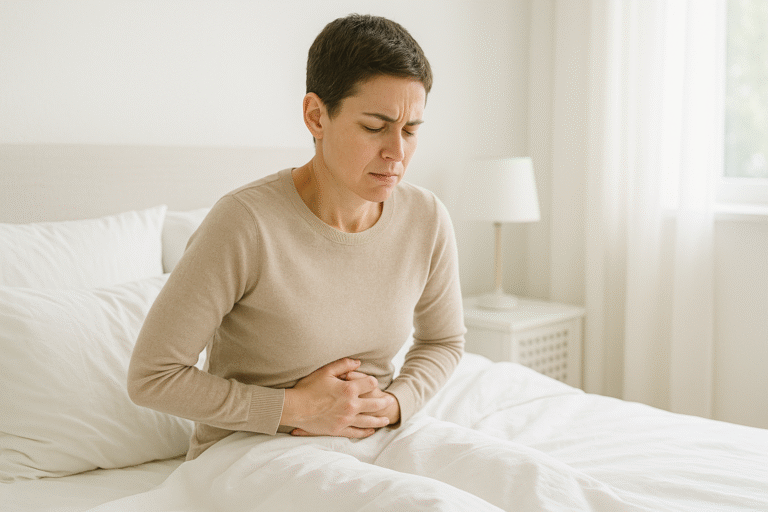If you live with Crohn’s disease, heartburn can feel like an encore nobody asked for. The burning in your chest, the creeping acid, the late-night regret after a small snack. Many people treat it like ordinary reflux and carry on. The trouble is, treating Crohn’s disease heartburn as a separate issue can create a loop of quick fixes and restless nights. There is a smarter way to think about it, one that starts with curiosity, not panic, and always involves a conversation with a healthcare professional.
Crohn’s disease heartburn symptoms and causes
Crohn’s can affect almost any part of the digestive tract, from mouth to the other end, which is why upper-gut symptoms can occasionally appear as part of the wider picture1.
In some people it involves the stomach or oesophagus, which can feel like classic acid reflux even though the story is bigger than acid alone2. Because most people think of Crohn’s as a lower-gut condition, upper-gut symptoms are easy to mislabel as everyday heartburn.
Inflammation higher up can change how the stomach empties or how acid moves. That can amplify the familiar burn, the sour taste, the night-time discomfort, or the throat irritation. If that pattern is new for you, frequent, or different from your usual experience, speak with your healthcare professional. They can check whether the symptom is linked to Crohn’s or another condition.
Crohn’s and acid reflux connection
Heartburn happens when stomach acid moves up into the oesophagus and irritates its lining, leading to chest burning, sour taste, coughing at night, or a heavy feeling after eating3.
When you already have Crohn’s, this kind of discomfort can have several triggers. Inflammation, medication effects, or slower digestion can all play a part. Do not guess or self-treat indefinitely. Make a simple note of when symptoms occur and what you were eating or doing, then share that with your doctor or specialist nurse.

How perception affects how you respond
Humans respond to stories as much as sensations. If the feeling is described as “just acid,” you are more likely to treat it casually. If you describe it as “possibly linked to my Crohn’s,” you are more likely to track it, ask sharper questions, and discuss it sooner. The symptom has not changed; your mindset has.
Common thought patterns make a difference:
- Thinking “I have always had reflux, it is fine,” leads to inaction.
- Holding on to small comforts, like coffee or spicy food, can make things worse even when we know it might.
- Hoping a quick fix will solve everything often delays a proper review.
Recognising these habits does not solve the problem, but it does help you make clearer, calmer decisions.
Upper digestive involvement in Crohn’s
Crohn’s can sometimes reach beyond the intestines and affect the stomach or oesophagus. Clinical guidance recognises upper-digestive involvement in a minority of adults, which is small but not zero. Because it is relatively uncommon, people often assume their heartburn has nothing to do with Crohn’s.
If you notice frequent heartburn or new patterns of discomfort, bring them up during your next appointment so your clinician can decide on next steps4.
Practical ways to track Crohn’s disease heartburn
You do not need a complicated system to start understanding patterns. A few small habits can make a big difference.
- Keep a two-week note of when the burning happens, what you ate, how you slept, and any Crohn’s changes.
- Change one thing at a time, such as meal timing or portion size, to see what affects you most.
- Use honest language when describing symptoms. Instead of saying “It is nothing,” try “This keeps waking me and I want to understand it.”
- Bring your notes to your appointment so your healthcare professional has context.
These are not treatments. They are simple ways to collect useful information that can help your clinician guide you safely.
Everyday habits that may help reduce reflux discomfort
Public guidance often includes simple routines that can make reflux symptoms easier to manage. Discuss these with your clinician before making changes, especially if you are on medication [5][6][7][8].
- Eat smaller meals and give yourself time before lying down5.
- Sit upright for at least half an hour after eating.
- Raise the head of your bed slightly rather than stacking extra pillows6.
- Notice evening triggers such as late caffeine, alcohol, or large portion
- Redesign rituals rather than giving them up. A smaller mug or lower-acid coffee can help keep your comfort without the burn7.
Coffee and Crohn’s disease heartburn
Coffee is routine and comfort rolled into one. Even when it triggers heartburn, most of us find reasons to keep it exactly as it is. Instead of arguing with yourself, rethink the ritual. Try a smaller cup, a different time of day, or a lower-acid blend. You keep what you enjoy and test the part that causes trouble. This kind of small experiment is easy to discuss with your healthcare professional and simple to reverse if it makes no difference.
When to contact a healthcare professional
Persistent or worsening heartburn always deserves a professional opinion. If the discomfort interrupts sleep, affects eating, or feels different from your usual Crohn’s pattern, contact your doctor or specialist nurse. They can check possible causes and discuss safe options.
No article should replace professional medical advice. Use this information to prepare better questions and understand your symptoms more clearly, but let a qualified professional guide diagnosis and treatment.
Rethinking Crohn’s disease heartburn
Crohn’s disease heartburn is often misunderstood. Sometimes it behaves like typical acid reflux. Sometimes it reflects inflammation higher in the digestive system. Sometimes it is unrelated to Crohn’s altogether. The important thing is to treat the symptom as information rather than an inconvenience.
Keep track, stay curious, and speak with a healthcare professional. You will make better decisions and avoid wasting energy on guesswork.
Key takeaways
- Crohn’s disease heartburn can happen when inflammation affects the upper digestive system.
- The story you tell yourself changes how seriously you treat a symptom.
- Small, practical changes make discussions with clinicians more productive.
- Always consult a healthcare professional for diagnosis and personalised guidance.
Frequently asked questions about heartburn and Crohn’s disease
Yes, it can. Crohn’s sometimes affects the upper digestive tract, which can lead to reflux-like discomfort. Always check with your healthcare professional for confirmation.
If heartburn is persistent, severe, or different from what you normally experience, contact your doctor. This is especially important if it disturbs sleep or appetite.
Simple measures such as eating smaller meals, avoiding late-night snacks, and staying upright after eating can help some people. Discuss any changes with your clinician first.
Some over-the-counter products can interact with prescribed medicines. Only start or change medication on professional advice.
It is uncommon but recognised in adults. Even if it affects only a small number of people, it is worth mentioning if your heartburn is frequent or different from usual.

- https://www.mayoclinic.org/diseases-conditions/crohns-disease/symptoms-causes/syc-20353304 ↩︎
- https://academic.oup.com/ecco-jcc/article/13/2/144/5078195 ↩︎
- https://www.nhs.uk/conditions/heartburn-and-acid-reflux/ ↩︎
- https://pmc.ncbi.nlm.nih.gov/articles/PMC6422852/ ↩︎
- https://www.nhsinform.scot/illnesses-and-conditions/stomach-liver-and-gastrointestinal-tract/gastro-oesophageal-reflux-disease-gord/ ↩︎
- https://www.uhsussex.nhs.uk/wp-content/uploads/2022/08/Advice-on-management-of-gastro-oesophageal-reflux.pdf ↩︎
- https://gutscharity.org.uk/advice-and-information/symptoms/heartburn-and-reflux/ ↩︎





